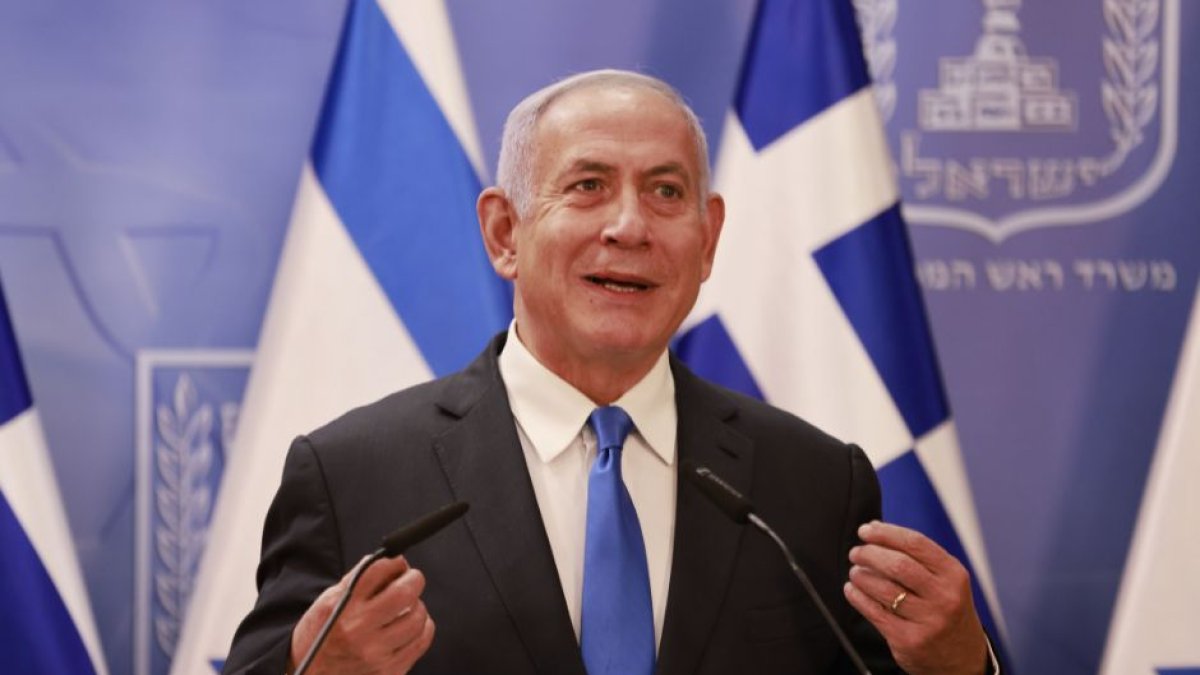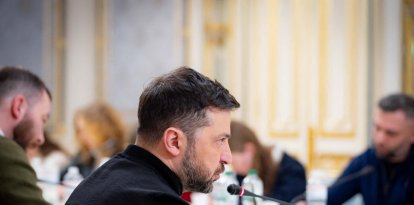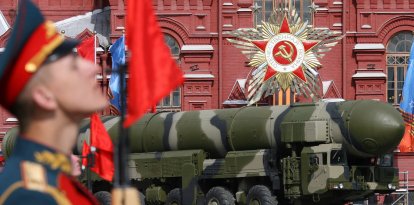Chief prosecutor of the International Criminal Court calls for the arrest of Netanyahu and his Defense Minister
Karim Khan added to his petition the Hamas leaders, Yahya Sinwar, Mohammed Diab Ibrahim Al-Masri Deif and Ismail Haniyeh, as responsible for crimes against humanity committed in the October 7 attacks.

(Cordon Press)
Karim Khan, chief prosecutor of the International Criminal Court (ICC), requested this Monday the arrest of Israel's Prime Minister, Benjamin Netanyahu, and his Defense Minister, Yoav Gallant, for crimes committed in the Gaza Strip during the ground military operation against the terrorist group Hamas.
In the same announcement, the ICC chief prosecutor also registered the request for the arrest of the three top Hamas leaders, Yahya Sinwar, Mohammed Deif Diab Ibrahim Al-Masri and Ismail Haniyeh. He accuses the leaders of the Islamist group of being responsible for several crimes against humanity committed against the Israeli civilian population on October 7.
Along with his statement, Karim Khan also broke the news on CNN. The chief prosecutor claims that his office has sufficient evidence to believe that the Israeli government is responsible for at least seven crimes in violation of the Rome Statute, the charter by which the ICC is governed. The chief prosecutor cited the use of starvation against civilians as a weapon of war and attacks against the civilian population.
"My office asserts that the evidence we have gathered, including interviews with survivors and eyewitnesses, authenticated video, photographic and audio material, satellite imagery and statements by the alleged perpetrator group, demonstrates that Israel has intentionally and systematically deprived the civilian population in all parts of Gaza of objects indispensable to human survival," Karim Khan asserted in his statement.
Hamas accused of extermination and sexual violence
In the same way, Khan reported the crimes with which the leadership of the Hamas terrorist group is charged. These include at least eight separate charges for crimes committed during and after the October 7 attacks in southern Israel. Others relate to the inhumane and degrading treatment of the hostages once in the Gaza Strip. The ICC prosecutor is relying on charges of extermination as a crime against humanity; murder as a crime against humanity; hostage-taking as a war crime; rape and other acts of sexual violence as crimes against humanity in addition to torture.
"My office also asserts that there are reasonable grounds to believe that hostages abducted in Israel have been held in inhumane conditions and that some have been subjected to sexual violence, including rape, while in captivity. We have reached this conclusion based on medical records, contemporaneous documentary and video evidence, and interviews with victims and survivors. My Office is also continuing to investigate allegations of sexual violence committed on October 7," Khan said in his statement. The chief prosecutor asserts that Hamas leaders Haniyeh and Sinwar, as well as al-Qassam Brigades chief Mohamed Deif Diab Ibrahim al-Masri, were the ultimate perpetrators and instigators of all these crimes and the consequences they entailed.
Reactions in Israel
Israeli society expressed its dismay at the ICC chief prosecutor's announcement. Political leaders in Israel largely condemned Chief Prosecutor Karim Khan's request. Naftali Bennet, a former prime minister who shared a term with current opposition leader Yair Lapid, called Khan's announcement "a moment of shame for the ICC" as well as a "huge boost to global jihadist terror."
The current Israeli Justice Minister, Yariv Levin, also addressed Chief Prosecutor Khan's request, describing it as "one of the greatest moral disgraces in the history of mankind." From the Knesset, which opened its first plenary session of the summer on Monday, its chairman, Amir Ohana (Likud) also criticized the ICC prosecutor's decision. "The International Criminal Court in The Hague has shown the world that it is not legitimate," Ohana said.
"I cannot open the meeting without referring to the outrageous decision of the ICC prosecutor that places the State of Israel, whatever its leaders, alongside the murderous terrorist organization Hamas, which kidnaps, tortures, burns, massacres and murders Jews because they are Jews and Israelis because they are Israelis," said the Israeli parliament speaker.
Foreign Minister Israel Katz issued a statement in which he called the request by the ICC chief prosecutor an "unrestricted direct attack" on the victims of the October 7 Hamas onslaught and the hostages still held in Gaza. He added that Israel will "forever remember" this request by Karim Khan.
"While the murderers and rapists of Hamas commit crimes against humanity against our brothers and sisters, the [ICC] prosecutor mentions at the same time the prime minister and defense minister of Israel alongside the vile Nazi monsters of Hamas, a historical disgrace that will be remembered forever," Katz added.
United States calls the decision 'outrageous'
The White House issued a statement expressing its concern about the ICC's decision to issue an arrest warrant for Netanyahu and Gallant. Additionally, the Biden administration reiterated its support for Israel and clarified that the determinations made by the Israeli government are in complete opposition to the terrorist attacks perpetrated by Hamas.
"The ICC prosecutor's application for arrest warrants against Israeli leaders is outrageous. And let me be clear: whatever this prosecutor might imply, there is no equivalence — none — between Israel and Hamas. We will always stand with Israel against threats to its security," said President Joe Biden
From Europe, Hungary's conservative Prime Minister Viktor Orbán also condemned the ICC prosecutor's request. "The ICC chief prosecutor's proposal against Prime Minister Netanyahu is absurd and shameful. Such initiatives will not bring the Middle East closer to peace, but will only fuel more tensions," the leader wrote.
The limited scope of the ICC
The International Criminal Court, with headquarters in The Hague and Rome, is limited in scope by its founding charter, the Rome Statute. It is an international legal text with several countries as members and signatories. These situations determine in what form the principles and articles of the Rome Statute are binding.
Neither Israel nor any Palestinian territory is a signatory to the Statute and therefore the ICC has limited power over them. The ICC has jurisdiction over the territory of states that are part of the Rome Statute or over crimes committed by nationals of these states. It can also intervene if a case is referred by the UN Security Council or if a state accepts its jurisdiction on an ad hoc basis.
In the event that the ICC accepts the chief prosecutor's request, it may call upon the countries that are part of the Rome Statute to implement the necessary measures. This could involve asking one of the 124 member States to carry out the arrest as requested by the prosecutor's office. The ICC may also request cooperation from states that are not part of the Rome Statute. Although these states are not legally bound to comply, some countries may choose to cooperate for diplomatic, political or justice-related reasons.
These avenues are more feasible than resorting to the UN Security Council, given the likelihood of a United States veto against any resolutions dictating the arrest of Benjamin Netanyahu.
*This is a developing story.

























